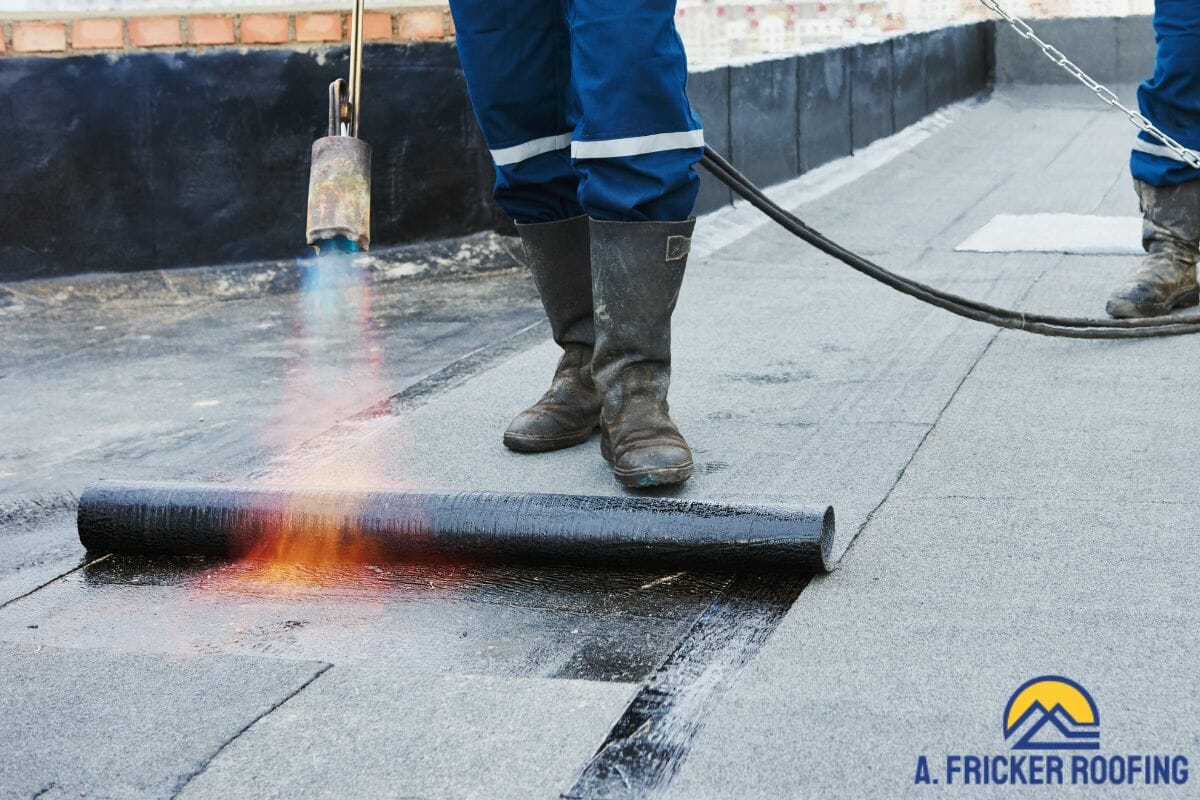Modified bitumen was first used commercially in roofing in Europe in the early 1960s. It has been used successfully in the United States and Canada since 1975. For many years, the most commonly used roofing system was the built-up roof, which combined asphalt with a layer of gravel.
However, this complex system is costly, difficult to install, and sometimes unable to stand the extreme temperatures of cold winters or hot summers. Extensive modifications to modified bitumen roofs have made it one of the most trusted flat roofing systems used today.
Our team at A. Fricker Roofing and Waterproofing has been helping people make informed decisions about their roofs and has put together a guide to help you understand the pros and cons of the Modified Bitumen Roofing system. With the help of our blog, you will get to know about:
- What Is A Modified Bitumen Roofing System?
- Installation Methods
- Pros And Cons
- Cost Consideration
What Is A Modified Bitumen Roof?
Modified Bitumen is a waterproof material used in roofing. The polymer-modified bitumen is reinforced by several layers of glass fiber or polyester fabric or a combination of the two. Modified Bitumen roofing can be installed either by using a hot tar process or by using adhesive. Due to the presence of bitumen, it is often referred to as the ‘cousin’ of the Built-Up roofing system.
It has a five-layer combination of roofing components for protection against harsh weather. The layers include:
- Insulation – It provides thermal resistance or “R-Value,” helping maintain the roofing system temperature stability.
- Modified Base Sheets or Plies – Modified-base sheets are fiberglass sheets coated with modified bitumen asphalt, which gives them a heavy-duty surface.
- Modified Bitumen Membranes – Modified-bitumen sheet membranes are factory-made and reinforced with fiberglass or polyester copolymer.
- Adhesive – It is a water-resistant material that bonds one surface to another when hot or cold.
- Surfacing – The top layer of the roof provides it with weather resistance and protection from the sun’s ultraviolet rays.
Application Methods For Modified Bitumen Roofing System
A variety of application methods are available within the modified bitumen material as well. There are two commonly used types of sheets manufacturers produce for this roofing system. These are:
- Atactic Polypropylene (APP)
- Styrene Butadiene Styrene (SBS)
Let us take a look at both of them:
SBS Sheet
SBS is short for Styrene-Butadiene-Styrene, a synthetic rubber used to make modified bitumen sheets. It is more flexible than other modified bitumen types, making it a popular choice for roofs prone to heavy loads or high temperatures, like those on warehouses or large industrial buildings. You can install SBS-modified bitumen with the help of multiple methods, allowing more flexibility.
APP Sheet
APP stands for Atactic Polypropylene. It is a type of thermoplastic that is mixed with modified asphalt. It’s a modified bitumen sheet that has been treated with polymers to make it more resistant to UV radiation and weathering. APP is less flexible than other types of modified bitumen sheets, such as SBS, but it’s not as resistant to heat and cold as other options.
The contractor will install an APP sheet with the help of a torch-application method.
8 Pros and Cons of Modified Bitumen Roofing
Modified bitumen roofing is a popular choice for Oklahoma residents because it’s easy to maintain and relatively inexpensive. Here are some of the pros and cons:
Pros Of Modified Bitumen Roofing Systems
We hope that you understand what modified bitumen roof systems are and their different types. Now it is time to understand the benefits of this membrane.
Ease OF Installation
When it comes to commercial roofs, most roofing membranes involve complexities and, thus, are difficult to install. So if we compare it with materials such as built-up roofing system, a modified bitumen roof is relatively easier to put together. This single-ply roofing system comes in sheets and rolls that can be easily installed. Thus you can save costs associated with labor.
Also, the roofing professional can install modified bitumen using multiple methods such as hot and cold applications.
Effective Against Leaks
The modified bitumen roofing system is very effective against leaks. This is because this type of roof does not have seams since it is applied with the help of an adhesive. Seams are the parts that are most vulnerable to leaks. This can let in water which can lead to the deterioration of the roof.
Since it is installed without seams, it is much less likely to leak and can act as a good waterproofing sheet.
Flexible Nature
Modified bitumen is made up of asphalt and reinforced fibers. Both these are very flexible materials that make the sheet highly resistant. This factor helps to make this roof famous not only for commercial but also for residential structures as well.
It is highly resistant to extreme temperature changes and offers excellent impact resistance, making it a popular choice for low slope roof applications.
Provides A Strong Structure
As a business owner, there is no doubt that you will need to select a durable roofing membrane that is strong enough to withstand the weather. This is where this system can help you.
A primary benefit of a modified bitumen roof is its strength and durability. The strong structure of modified roofs protects from wind, rain, and snow. It also helps to prevent leaks, which can be a problem with flat roofs. In addition to protecting the roof from damage caused by weather conditions, it also helps prevent collapse.
UV Protection
UV protection is an essential factor that must be considered when choosing a roofing material. Ultraviolet radiation is the cause of premature aging and damage to your roof, including discoloration, cracking, and fading. This can be avoided with proper UV protection in your roofing material.
The modified bitumen roofing system is known to provide good heat resistance, especially if you install an APP-modified bitumen sheet, as it is even better regarding reflectivity.
Environmental Friendly
Modified bitumen is an environment-friendly option that can withstand harsh exposure. It can be recycled at the end of its use. That is, it can be effectively repurposed. This allows owners to avoid the added expense of construction waste removal and helps them reduce their carbon footprint.
With the help of this roof, you are not only getting effective performance but are also doing your bit for the environment. Businesses and homeowners can reuse materials from old roofs, which prevents these materials from ending up in landfills and harming the environment.
Cons Of Modified Bitumen Roofing Systems
While modified bitumen has many advantages, such as its ability to resist extreme temperatures and its durability, it has some drawbacks. Let us take a look at some of them.
Lifespan Can Be A Problem
A good life expectancy is one of those factors that you are most likely to consider while deciding on a suitable roofing material. If your roof has a long life, it will give you peace of mind, and you can focus on your business without stress.
With a modified bitumen roofing system, life expectancy can be an issue. It generally lasts for 15 to 20 years. While this is not bad for a commercial roof, it lags when we compare it with other popular roofing membranes, such as EPDM roofing systems.
Can Get Damaged From Standing Water
Flat roofs are characterized by their low slope. Due to the absence of a slant slope, it becomes tough for the water to flow down, leading to standing water. The longer the water stays on your roof, the more it can be damaged. One of the main disadvantages is that modified bitumen roofing systems can get damaged more quickly from standing water.
So during the rainy season, you need to ensure that the water does not stay longer on your roof as it can cause much damage.
Want To Install A Modified Bitumen Roof?
We hope you learned a lot about modified bitumen roofing systems and how they can add value. If you find it suitable for you and are looking for professional roofing contractors, then make sure to contact A. Fricker Roofing and Waterproofing.
We are the best in the business. Our company has been providing roofing services for years. Our crew has a combined experience of 50 years, and we’ve installed many Modified Bitumen roofs in Tulsa and surrounding areas.
Give us a call today at (918) 402-7167 to schedule an appointment with one of our experienced roofing professionals. We’ll walk through your property and ensure we understand exactly what you’re hoping to achieve.


